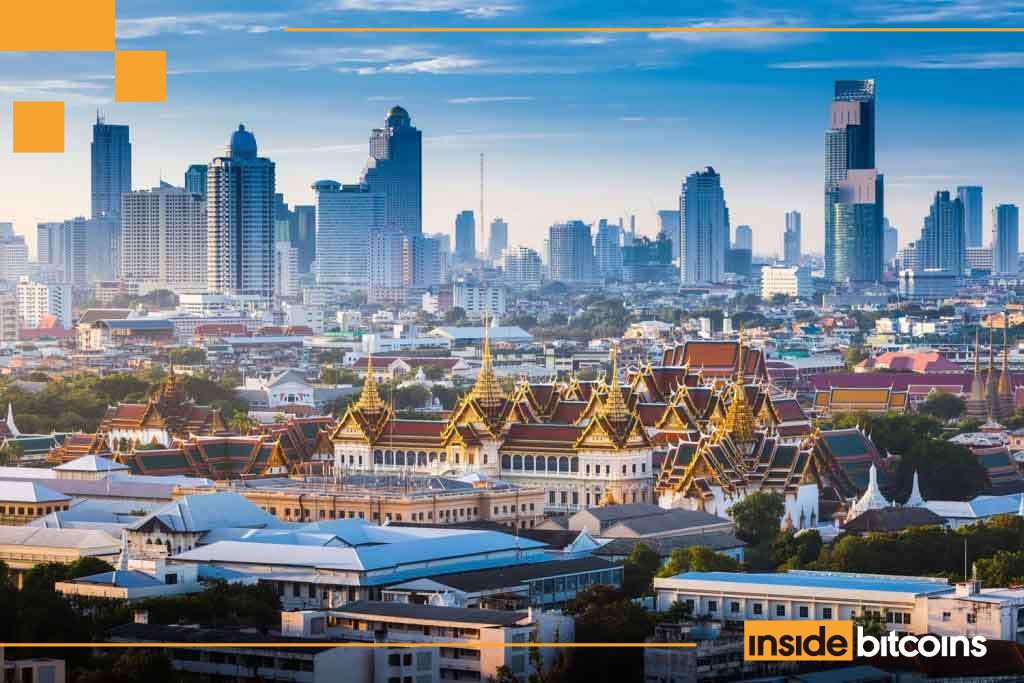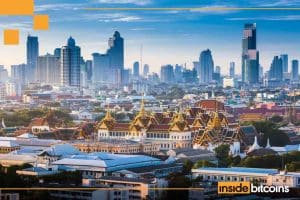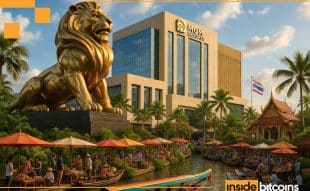Join Our Telegram channel to stay up to date on breaking news coverage
MGM Resorts International, one of the world’s largest casino operators, has publicly called on Thailand’s government to adopt a competitive tax regime and permit local residents to gamble in the country’s proposed integrated resort (IR) casinos. The company has signaled its willingness to invest up to $5 billion in a flagship resort in Bangkok, but only if the regulatory framework proves attractive to international investors and operators seeking to establish world-class gaming destinations in Southeast Asia.
This intervention comes as Thailand advances its Entertainment Complex Bill through legislative channels, with the Senate currently reviewing comprehensive proposals that would legalize integrated resorts with casinos in select cities. MGM’s advocacy reflects broader industry concerns about creating a viable regulatory environment that can compete with established gaming jurisdictions like Singapore and Macau while addressing local social and economic considerations.
Key Takeaways
- Substantial Investment Commitment: MGM Resorts has expressed willingness to invest $3-5 billion in a Bangkok integrated resort, contingent on favorable regulatory conditions.
- Tax Rate Advocacy: The company urges Thailand to adopt Singapore’s competitive 17% tax rate on gross gaming revenue rather than higher rates seen in Macau (40%) or Japan (30%).
- Local Access Essential: MGM strongly recommends allowing Thai residents to access casinos with reasonable entry fees, warning against South Korea’s restrictive model that has led to operator financial distress.
- Legislative Timeline: Thailand’s Entertainment Complex Bill is expected to reach parliament by July 2025, with first integrated resorts potentially opening by late 2025 or 2026.
- Regulatory Framework: The proposed legislation limits casino floor space to 10% of total development area and includes strict identity verification and anti-online gambling measures.
- Economic Impact: Successful implementation could create thousands of jobs, boost tourism, and generate significant tax revenue for public programs.
- Responsible Gaming: Major operators pledge robust responsible gambling and anti-money laundering measures to address social concerns.
Thailand’s Legislative Progress
Thailand is in the advanced stages of drafting its Entertainment Complex Bill, which represents the country’s most significant gambling policy development in decades. The legislation would fundamentally transform Thailand’s approach to gaming, moving from prohibition to regulated integrated resort development in designated areas.
Current Bill Provisions
The draft legislation includes several key elements designed to balance economic opportunity with social protection:
Casino Floor Limitations: Gaming areas would be restricted to 10% of total development space, ensuring integrated resorts focus primarily on non-gaming amenities such as hotels, restaurants, shopping, entertainment venues, and convention facilities. This approach mirrors successful models in Singapore and other jurisdictions where gaming serves as an anchor attraction rather than the primary focus.
Mandatory Identity Verification: All casino visitors would be required to present valid identification, creating a comprehensive system for tracking access and implementing responsible gambling measures. This requirement would apply to both local residents and international tourists.
Online Gambling Restrictions: The legislation includes strict measures against online gambling operations and prohibits live-streaming of gaming activities from casino locations. These provisions aim to maintain the physical nature of casino operations while preventing digital expansion that could complicate regulation.
Entry Fee Structure: Perhaps most significantly for potential operators, the bill contemplates entry fees for local residents ranging from 1,400 to 5,000 baht ($41-$140). Notably, earlier proposals for a “millionaire clause” requiring visitors to demonstrate $1.5 million in assets have been abandoned as impractical and potentially discriminatory.
Legislative Timeline and Process
The Senate’s review process involves dedicated subcommittees examining social, regulatory, and economic implications of casino legalization. This comprehensive approach reflects the Thai government’s recognition of both the opportunities and risks associated with introducing legal gambling.
Current projections suggest the bill will be introduced to parliament by July 2025, with implementation potentially beginning in late 2025 or early 2026. This aggressive timeline reflects government eagerness to capture regional gaming market share and address economic recovery priorities following the COVID-19 pandemic.
MGM’s Strategic Position and Recommendations
MGM Resorts’ public intervention in Thailand’s legislative process reflects the company’s significant interest in the Southeast Asian market and its assessment that Thailand could become a major regional gaming destination with appropriate regulatory policies.
Competitive Tax Rate Advocacy
Ed Bowers, President of Global Development at MGM Resorts, has been particularly vocal about the importance of competitive taxation, urging Thai lawmakers to consider Singapore’s 17% gross gaming revenue tax as a model rather than the significantly higher rates implemented elsewhere in Asia.
“Integrated resorts not only have a significant impact on economies and tourism, but they also help to eliminate existing problems related to gambling,” Bowers stated. “It is essential governments understand the fundamentals of how the casino business works.”
This position reflects industry-wide concerns about tax rates that could undermine project viability. At 40%, Macau’s tax rate is considered sustainable only because of the jurisdiction’s unique proximity to mainland China and established market position. Japan’s 30% rate has contributed to project delays and reduced international interest, while South Korea’s restrictive policies have led to operator financial difficulties.
Singapore Model as Template
MGM’s advocacy for Singapore-style policies extends beyond taxation to encompass the broader regulatory approach that has made Singapore one of the world’s most successful gaming markets despite its small size. Key elements of the Singapore model include:
- Reasonable tax rates that allow operators to achieve returns commensurate with investment risk
- Professional regulatory oversight that maintains market integrity
- Balanced approach to local access that generates revenue while implementing responsible gambling safeguards
- Integration requirements that ensure gaming supports broader tourism and economic development objectives
“Singapore demonstrates that a balanced approach can create world-class destinations that benefit both operators and the local economy,” Bowers noted. “Their success should inform Thailand’s policy decisions.”
Local Access and Entry Fees
Perhaps MGM’s strongest advocacy relates to local access policies, with the company warning against overly restrictive approaches that could undermine project economics. Bowers specifically cited South Korea’s model, where most casinos are restricted to foreign tourists, as a cautionary example.
The Inspire Resort in Incheon, which lost $104 million in its first year of operation, exemplifies the challenges of foreigner-only gaming policies. Without access to local markets, operators face significant limitations in building sustainable customer bases and achieving consistent revenue streams.
MGM recommends Thailand adopt Japan’s approach of modest entry fees (approximately ¥6,000 or 1,400 baht) that balance access with responsible gambling objectives. Such fees would be meaningful enough to discourage casual or impulsive gambling while remaining accessible to middle-class Thai residents.
Investment Commitment and Development Vision
MGM’s $3-5 billion investment commitment represents one of the largest foreign direct investment proposals in Thailand’s hospitality sector. The company has specifically identified Bangkok as its preferred location, citing the capital’s population density, infrastructure quality, and established tourism appeal.
Bangkok Development Proposal
MGM’s Bangkok vision encompasses a comprehensive integrated resort that would include:
- World-class hotel facilities with multiple brands and price points
- Extensive convention and meeting facilities to support business tourism
- Retail and dining venues featuring both international and local concepts
- Entertainment venues including theaters and event spaces
- Gaming facilities designed to international standards
- Transportation infrastructure and connectivity improvements
This development model reflects MGM’s global approach to integrated resorts, where gaming revenues support broader entertainment and hospitality offerings that appeal to diverse customer segments.
Economic Impact Projections
Industry analysts suggest MGM’s proposed investment could generate substantial economic benefits for Thailand:
- Direct Employment: 8,000-12,000 permanent jobs across all skill levels
- Indirect Employment: Additional 15,000-20,000 jobs in supporting industries
- Tax Revenue: $200-300 million annually in various taxes and fees
- Tourism Growth: Potential to attract 2-3 million additional international visitors annually
- Infrastructure Investment: Significant improvements to transportation and utilities
These projections assume successful implementation of competitive regulatory policies that allow integrated resorts to achieve their full potential as tourist destinations.
Industry and Government Response
Thailand’s government has generally responded positively to international operator interest, recognizing integrated resorts as potentially transformative for the country’s tourism and entertainment sectors.
Government Perspective
Prime Minister Paetongtarn Shinawatra and other senior policymakers have voiced support for casino legalization as part of broader economic recovery and growth strategies. The government sees integrated resorts as particularly valuable for:
- Diversifying tourism beyond traditional beach and cultural attractions
- Competing with regional destinations like Singapore, Macau, and the Philippines
- Generating substantial tax revenue for public programs including education and social welfare
- Creating high-quality employment opportunities in tourism and hospitality
Government officials have indicated willingness to consider international operator recommendations while balancing economic objectives with social concerns about gambling’s potential negative impacts.
Industry Consensus
MGM’s positions reflect broader industry consensus about essential elements for successful integrated resort development. Other major operators, including Las Vegas Sands, Wynn Resorts, and Galaxy Entertainment, have expressed similar views about competitive taxation and local access policies.
“The industry has learned from experiences across Asia that certain regulatory approaches consistently lead to success while others create challenges,” explains gaming industry consultant Michael Thompson. “MGM’s recommendations reflect those lessons and genuine interest in creating sustainable businesses in Thailand.”
Several operators have indicated they would consider substantial investments in Thailand if the regulatory framework proves competitive with other regional jurisdictions.
Regional Competition and Market Context
Thailand’s casino legislation development occurs within an increasingly competitive regional gaming landscape, with multiple Southeast Asian jurisdictions pursuing integrated resort strategies.
Competitive Market
- Singapore: Maintains its position as the premium regional destination with two highly successful integrated resorts
- Philippines: Entertainment City in Manila continues expanding with multiple major properties
- Vietnam: Several provinces have approved integrated resort developments with varying success
- Cambodia: Long-established gaming market primarily serving regional tourists
- Myanmar: Political instability has curtailed gaming development
Thailand’s late entry into this market creates both challenges and opportunities. While established destinations have captured market share, Thailand’s tourism infrastructure and brand recognition provide competitive advantages that could support successful integrated resort development.
Market Opportunity Assessment
Industry analysts suggest Thailand could capture significant market share through differentiated positioning:
- Scale Advantage: Thailand’s large domestic population provides a substantial local market if access policies are appropriate
- Tourism Integration: Existing tourism infrastructure and international recognition support integrated resort development
- Regional Connectivity: Bangkok’s position as a regional transportation hub facilitates access from across Asia
- Regulatory Opportunity: Learning from other jurisdictions’ experiences could help Thailand avoid common pitfalls
However, success depends critically on implementing policies that attract international investment while addressing legitimate social concerns.
Responsible Gaming and Social Safeguards
Major operators, including MGM, have pledged to implement comprehensive responsible gambling programs as part of their Thailand development proposals. These commitments address government and civil society concerns about gambling’s potential social impacts.
Proposed Safeguards
International operators have outlined extensive responsible gaming measures:
- Player Education: Comprehensive programs educating customers about gambling risks and available resources
- Self-Exclusion Systems: Technology enabling individuals to restrict their own access to gaming facilities
- Spending Limits: Tools allowing customers to set and enforce personal spending restrictions
- Staff Training: Extensive training for casino employees to identify and assist customers showing signs of gambling problems
- Treatment Partnerships: Collaboration with local healthcare providers to ensure treatment availability
- Research Support: Funding for research into gambling behaviors and effective intervention strategies
Anti-Money Laundering Measures
Operators have also committed to sophisticated anti-money laundering systems:
- Customer Due Diligence: Comprehensive identification and background verification for significant customers
- Transaction Monitoring: Advanced systems tracking unusual betting patterns or financial transactions, including crypto gambling related systems
- Regulatory Reporting: Regular reporting to Thai authorities about suspicious activities
- Staff Training: Specialized training for employees to identify potential money laundering indicators
- International Cooperation: Collaboration with global authorities to prevent cross-border financial crimes
These commitments reflect industry recognition that social responsibility is essential for long-term success and regulatory acceptance.
Conclusion: Shaping Thailand’s Gaming Future
MGM Resorts’ public advocacy for competitive taxation and local access policies reflects more than corporate self-interest—it represents the gaming industry’s assessment of essential elements for successful integrated resort development in Thailand. The company’s $5 billion investment commitment demonstrates genuine confidence in Thailand’s potential as a major regional gaming destination, contingent on appropriate regulatory policies.
For Thailand’s government, MGM’s recommendations offer valuable insights from an operator with extensive global experience in integrated resort development. The choice between Singapore-style competitive policies and more restrictive approaches will largely determine whether Thailand captures its potential share of the regional gaming market.
The legislative process continues through 2025, with final parliamentary consideration expected by July. The decisions made will influence not only MGM’s investment plans but the broader international operator community’s assessment of Thailand as an investment destination.
As Ed Bowers concluded in his advocacy: “The fundamentals of successful casino business are well-established through global experience. Thailand has the opportunity to learn from both successes and failures in other markets to create policies that benefit everyone involved.”
The coming months will determine whether Thailand seizes this opportunity to join Singapore and Macau as Asia’s premier gaming destinations, or whether restrictive policies will limit the sector’s potential contribution to the country’s economic development.
Related News
elated Pages
- Thailand’s Casino Legalization Receives Widespread Public Support
- Thailand Introduces Exclusive Bitcoin ETF for Ultra Wealthy Investors
- Thailand Launches Digital Asset Regulatory Sandbox for Crypto Service Testing
Join Our Telegram channel to stay up to date on breaking news coverage


